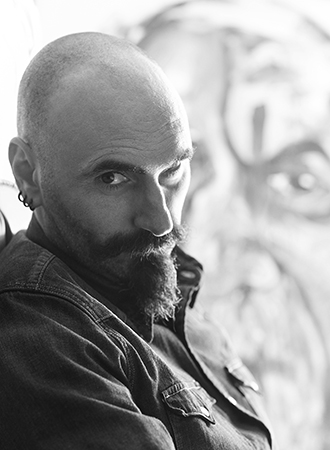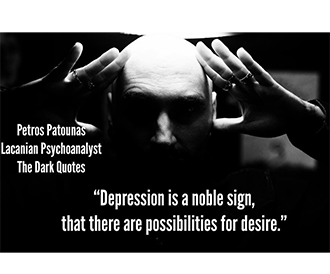And he who has fathomed and now does not, has spoken: and has not asked Quis ut Deus but Qui est Psychoanalyst– and when he has spoken it is then that he Acts: for, the Gods are in the field of the Real: and let that he, that he who has encountered the divine disease to lambaste silence with nails and mallet to engrave the direction from that virus of the lavation knowledge, so as that remains a mystery for she who is a lady and whose femininity is making the mise en scène and not the Other Scene of the Das Ding: for the symptom is a cause not defined, ἀόριστον wrote the philosopher: lo and behold to the psychoanalysts who think they are speaking beings and not Ergon: the Act and the constr-a-ction of desire are the stigmata of such an encounter from the time when full speech chronicles the verb and the ErgOn- it is speech which performs: that which cannot be said, is an Act- and that is the holy communion of language.
He, that he of a Pyrrhonian skepticism, who does not pay the price, only speaks of its desire- and he who thinks that has spoken it, subtracting from that speech the act, has not spoken about it, for, desire can only be ethical versifying the speaking body from the scene to the world, not the social: he who speaks, says I have spoken- and I desire therefore I Act: he who has spoken and acted is not a Pharisee, and denies the position of the psychoanalyst bequeathing value to the proposal of that which is thought to be a location but it is not, for, it moves in mysterious ways for him who practices psychoanalysis∙ and the spirits of the letters shape a poem, Where Ego was, the Ethic shall be- and where there was the scene, there shall be Kinesis∙ for, Εγώ εἰμι τὸ Α καὶ τὸ Ω, λέγει Κύριος ὁ Θεός, ὁ ὢν καὶ ὁ ἦν καὶ ὁ ἐρχόμενος, ὁ παντοκράτωρ: I am Kinesis, and where there was Language, the Lunguage shall itemize the Letters of the Breath to the everlasting destiny of he who desires without the phallus: and speaking of schizophrenia, let us mention clandestinely, that the object is embodied as a mirror to those magnificent, so called, Ordinary personal belongings, ordinary because the analysts motionless think in terms of the Other of the symptom, no less than a cognition of a different time limit and frame: psychoanalysts ought to ask themselves about the value of that Organon, that which we may consider as a Real Phallus: a noise provokes one to take into custody, that one scratches the pudenda of the flesh- a terrible joke for a saint apprised to isosyllabic aphorisms.
Truth can only be imaginary- a false bearing of the treatment, if the orientation aims at the Real∙ the ethic is the elucidation of psychoanalysts trapped into data and the questions of truth of information and not of in-formation: one ought to think of Scylla and Charybdis∙ and, truth be told, an expression reverberating once more and all over again as a joke to Lazarus or to the pre-mentioned saint, who, would have said something about it, that, that in a perverse structure there is the Nirvana of anxiety equivalent and not less to that experienced in schizophrenia at the moment of Discobolus’ Πάθος, when the flesh enclaves it to seizure and the explosion of the Real until there is the, either the passage to the act with the use of the fetish, or, the act of a passage in relation to a cause: and in the second case, it is not that the woman does not exist, but fantasy does not exist: it is hatched with Vulcan’s hammer around the ethic of the means to the threshold of the Act and convoyered faithfully by the Cerberus of responsibility that few dare to surpass, of this particular subject, placing its being at the source of the Drive and not its object.
And, the letter not at the place of the object alone, but in the motion of the phallus that, amicably extenuate itself in the Ousia, such is the arrival from the arena to the earth and when the signifier moxies further than the suppositious’ excellent determination of meaning∙ for, such a discontent cicatrices the one-by-one exception of the nullification of the one father who is to turn the wheel, not around itself but, a dose of unanimity, towards a new di-gnified direction- a Τύχη and not an Αυτόματον, an act and not a doing: and when nomination is indiscriminated by the maneuvering of letters instead of a name, according to Freud, is, then, a true example of a real assessment of someone possessing not long legs but long arms: Francis of Assisi, the Lady who is born from the Das Ding and whose w-hole being, of that Apeiron subject who, yet, is not a Goddess, is de-incarnated by the material substance of the fetish and is in search for a cause: it is he, though a she, he, “He who goes as far as he can in the path of desire:” but that, takes an even higher price to be paid than the symptom or a bereavement by life: it takes a death and a new being: such is the path of the psychoanalysts’ formation, those who shift the letters from Language to Lunguage, because das Ding is fainted to the perimeter of the signifier but not peripheral to lung-guage: it is not without a Letter and itself is not a body event∙ it can be asserted with a no-body eventualisation: the Act of desire is a result of the latter but very few deny to say, “I would prefer to be the slave of a slave than the king of the underworld,” because, they say, that there is a rudimentary incapability between speech and desire: yes, indeed, there is: these honorable mouths address a given legitimacy∙ that, no ὑποκείμενον can speak of its Breath: dear friend, there is no incapability between the Act and Desire, unless one still fantasizes the taxiarch who will act on the subject’s place and yet without stating: “Στώμεν καλώς, στώμεν μετά φόβου.”


Pingback: News – October 2014 | LACANONLINE.COM